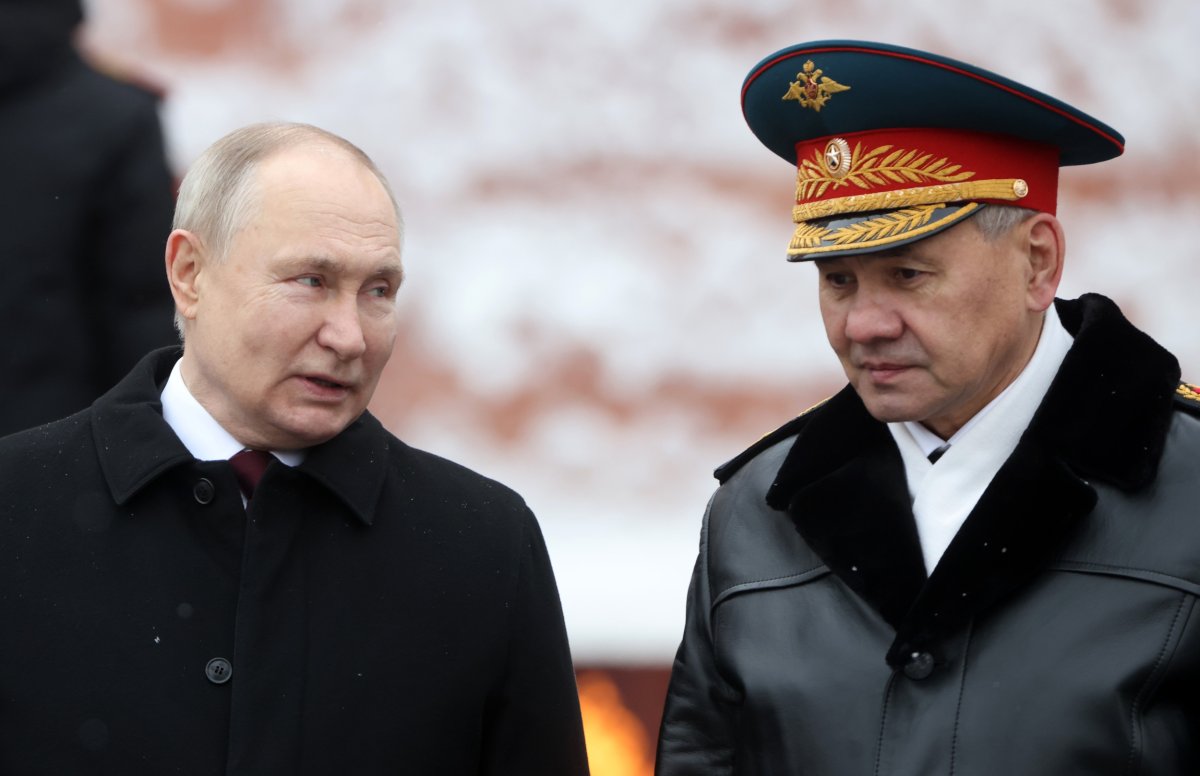Russia’s deputy defense minister was arrested Tuesday evening on bribery charges, but some analysts have speculated the detainment of Timur Ivanov was a warning to his boss, Defense Minister Sergei Shoigu.
Russian President Vladimir Putin “doesn’t sign off on that [arrest] unless he’s sending a message to Shoigu, one that reads something along the lines of ‘that could have been you,'” David Silbey, associate professor of history at Cornell and director of teaching and learning at Cornell in Washington, told Newsweek.
On Wednesday, Shoigu removed Ivanov from his post as deputy defense minister, according to Kremlin-controlled news agency TASS. Hours earlier, reports emerged of Ivanov’s arrest on accusations that he had been taking bribes on what a Moscow court called “a particularly large scale.” He could face 15 years in prison.
Prior to the arrest, Ivanov was in charge of Russian military infrastructure projects. Perhaps more importantly, he was widely seen as one of Shoigu’s closest allies. The two men had worked together for many years, including when Ivanov served as deputy prime minister of the Moscow region while Shoigu was the area’s governor.
Newsweek reached out to the Kremlin and the Russian Ministry of Defense on Wednesday via email for comment.

Russian President Vladimir Putin, left, talks to Defense Minister Sergei Shoigu during a ceremony on February 23 in Moscow. Russia’s deputy defense minister was arrested Tuesday night on bribery charges, leading to speculation that Putin…
Russian President Vladimir Putin, left, talks to Defense Minister Sergei Shoigu during a ceremony on February 23 in Moscow. Russia’s deputy defense minister was arrested Tuesday night on bribery charges, leading to speculation that Putin was sending a message to Shoigu. Photo by Contributor/Getty Images
The Kremlin has denied early reports that Ivanov’s arrest was related to treason, but not everyone is convinced about Russia’s official line regarding Ivanov’s detention.
“Since corruption among top Russian officials is endemic, it’s hard to believe that the arrest of Shoigu’s deputy is just about corruption,” George Mason University Schar School of Policy and Government professor Mark N. Katz told Newsweek.
He continued, “Either he has done something else that someone opposed, or it is a move aimed at weakening Shoigu—or both.”
Shoigu has frequently been blamed for Russia’s shortcomings on the battlefield in Ukraine, including by former Wagner Group leader Yevgeny Prigozhin, who perished in a plane crash under mysterious circumstances after leading a mutiny against Moscow. Katz said the incident reminded him of the public feud between Shoigu and Prigozhin.
“The arrest harkens back to Prigozhin’s criticism last year of incompetence within the top Russian military leadership. Prigozhin is gone, but the problems he publicized remain,” Katz said.
“The real issue is not whether the deputy minister is corrupt. It is instead whether he, and—more to the point—Shoigu, have become centers of power in their own right,” William Reno, professor and chair of the political science department at Northwestern University, told Newsweek.
“Corruption in the current regime is a strategic asset that’s tolerated and even encouraged to cultivate a person’s loyalty and dependence on the political leadership and then used against them when they become a threat or need to be used as a convenient target of blame for the regime’s shortcomings,” Reno said. “Charging him with corruption at this juncture helps to undermine public trust and support for his boss, Shoigu.
“Charging a high official with corruption also highlights Putin’s sovereign right as leader to punish, reinforcing his authority among his subordinates and in the eyes of Russian citizens.”
Ivanov’s arrest may just be the beginning of what’s to come for Shoigu, according to Silbey.
“Remember that being ‘too powerful’ isn’t a deterrent to Putin (or any dictator) taking someone out, it’s an incentive,” he said. “The more powerful someone is, the more they’re an existential threat to the dictator. Joseph Stalin’s golden rule was ‘do unto others before they do it to you.'”
“It would not surprise if Shoigu is next or retires suddenly,” Silbey added.
Newsweek is committed to challenging conventional wisdom and finding connections in the search for common ground.
Newsweek is committed to challenging conventional wisdom and finding connections in the search for common ground.
